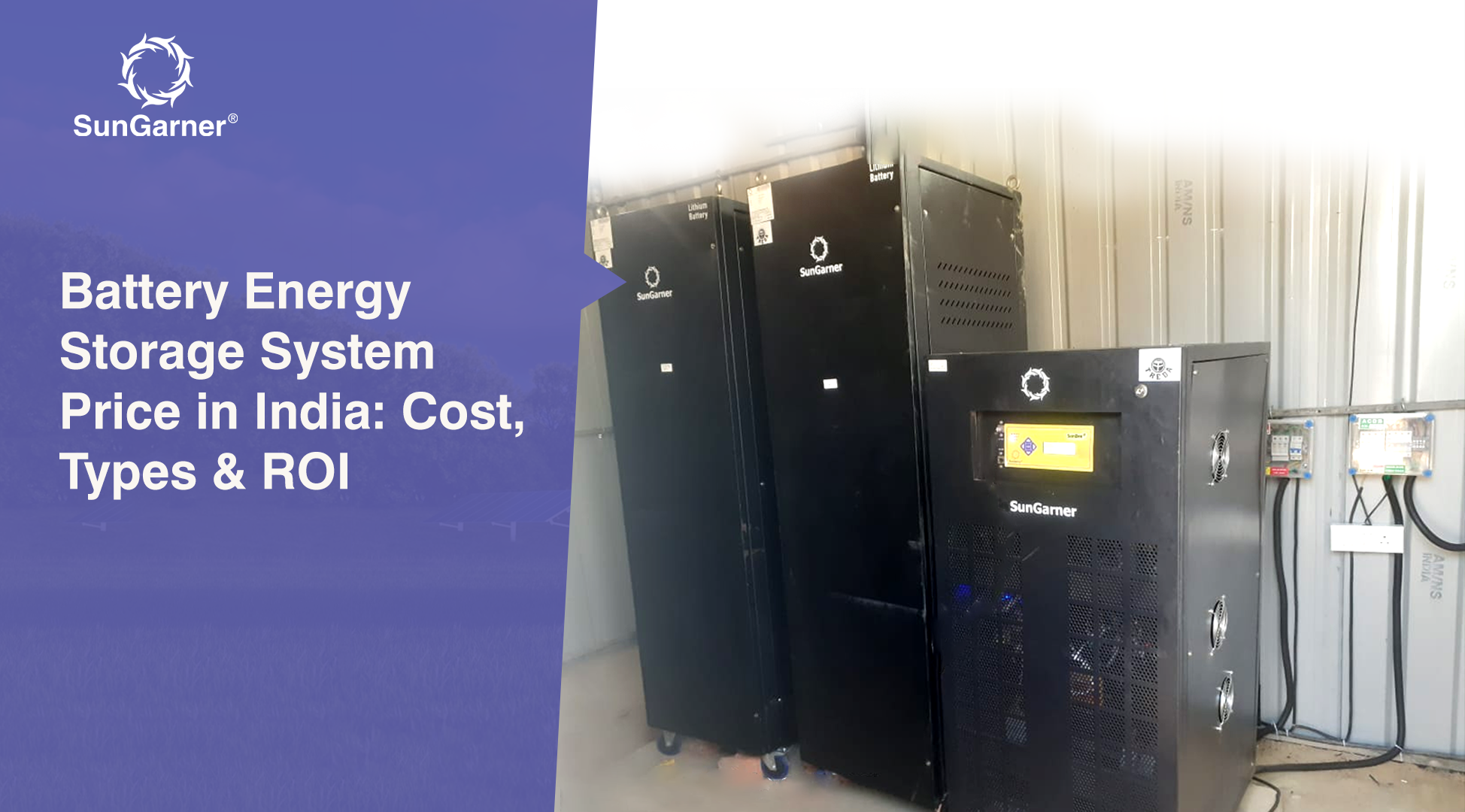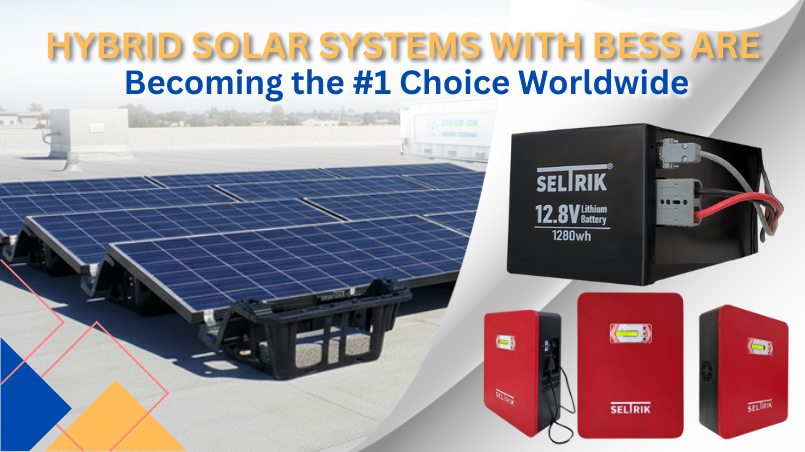Top Solar Battery Solutions in 2026: Features, Price & Performance
Choosing the right solar battery has become essential for efficient energy storage and uninterrupted power supply, especially as more homes and businesses transition to solar energy. In 2026, advancements in lithium-ion battery—particularly LiFePO4—are making batteries more efficient, affordable, and durable.
Choosing the right solar battery has become essential for efficient energy storage and uninterrupted power supply, especially as more homes and businesses transition to solar energy. In 2026, advancements in lithium-ion battery—particularly LiFePO4—are making batteries more efficient, affordable, and durable.
This blog explores the top solar battery solutions in 2026, comparing their features, price, and performance to help you make an informed decision for your energy needs.
Why Solar Batteries Matter in 2026
As clean energy adoption accelerates, solar batteries are no longer optional—they are a vital part of modern energy systems. Their importance is driven by several key factors:
- Rising electricity costs
- Frequent power outages
- Government incentives promoting solar adoption
- Growth in electric vehicles and smart home systems
- The need for low-maintenance, high-efficiency storage solutions
Key Features to Consider in a Solar Battery
When evaluating solar battery options in 2026, pay attention to these essential features—particularly in lithium-ion models, which dominate the market:
Battery Capacity (kWh)
Indicates how much energy a battery can store. Lithium-ion batteries offer high usable capacity in compact sizes.
Depth of Discharge (DoD)
LiFePO4 batteries often feature a DoD above 90%, allowing you to use most of the stored energy without degrading the battery’s lifespan.
Cycle Life
Lithium-based batteries deliver 4000 to 6000+ cycles, providing over a decade of dependable service.
Round-trip Efficiency
Most lithium-ion models achieve 90%+ efficiency, ensuring minimal energy loss during charging and discharging.
Battery Technology Types
|
Technology |
Key Features |
|
Lithium-Ion (Li-ion) |
High efficiency, long lifespan, low maintenance |
|
LiFePO4 |
Safer, thermally stable, 4000–6000+ cycles |
|
Lead-Acid |
Low initial cost, heavier, more maintenance required |
|
Gel |
Spill-proof, maintenance-free, lower cycle life |
Real Brands to Consider in 2026
When choosing a battery, selecting a reliable brand is just as important as the specifications. Below are some of the trusted solar battery brands in India for 2026:
- SunGarner – Known for high-quality LiFePO4 batteries with excellent performance and warranty support.
- Okaya – Offers a range of reliable lithium-ion and tubular batteries suitable for residential and commercial solar setups.
- Exide – A legacy brand offering advanced solar inverter and batteries at competitive prices.
- Tata Power Solar – Provides integrated solar solutions with durable battery options.
Always verify certifications such as BIS, IEC, or CE for assurance of quality and safety.
Solar Battery Prices in 2026 (India)
Here's a general comparison of battery prices in India:
|
Capacity |
Type |
Average Price (INR) |
|
1 kWh |
Lead-Acid |
₹10,000 – ₹15,000 |
|
1 kWh |
Lithium-Ion |
₹25,000 – ₹30,000 |
|
5 kWh |
LiFePO4 |
₹1,00,000 – ₹1,30,000 |
|
10 kWh |
LiFePO4 |
₹2,00,000 – ₹2,40,000 |
Note: These prices are expected to decline further with technological advancements and increased domestic manufacturing.
Emerging Performance Trends in 2026
Solar batteries in 2026 are smarter and more user-friendly than ever. Look for:
- Fast charging with intelligent controllers
- Modular systems that allow for easy expansion
- Mobile apps for monitoring energy storage in real time
- Maintenance-free lithium designs
- Integration with AI and IoT-based energy management systems
For example, some models now come with predictive analytics that optimize charging schedules based on weather patterns and usage history.
Choosing the Right Battery for Your Needs
Before purchasing, ask yourself the following:
- What is your average daily energy consumption?
- Do you need backup power or complete grid independence?
- Are you using a hybrid or fully off-grid system?
- Are you seeking a zero-maintenance option? → Lithium-ion fits best
- Does the brand provide certifications and warranty?
If your goal is long-term savings, low maintenance, and efficient energy use, lithium-ion and especially LiFePO4 batteries offer the best return on investment.
Common Applications in 2026
Solar batteries are widely used in various scenarios:
- Home backup systems
- Rooftop solar setups in apartments and societies
- Commercial offices and retail spaces
- EV charging stations
- Remote telecom towers and industrial sites
Final Thoughts
As the demand for clean and reliable energy grows, solar battery technology in 2026 is becoming more advanced and affordable. Among all options, lithium-ion—especially LiFePO4—stands out for its safety, lifespan, and efficiency. Whether you're upgrading your current setup or going solar for the first time, choosing the right battery based on features, price, and performance will be key to a successful and future-proof energy solution.
Frequently Asked Questions (FAQs)
Q. What type of solar battery lasts the longest?
A. LiFePO4 (Lithium Iron Phosphate) batteries can last over 6000 charge cycles, making them one of the most durable choices.
Q. Can a solar battery be used without solar panels?
A. Yes, but it’s not efficient. Solar batteries are designed to be charged by solar panels for maximum benefit.
Q. How do I calculate the size of the battery I need?
A. Estimate your daily energy usage in kWh and decide how many hours of backup you need. Multiply to get the ideal battery capacity.
Q. Do lithium-ion batteries need maintenance?
A. No. Lithium-ion batteries are fully maintenance-free, unlike lead-acid options.
Q. Are lithium-ion solar batteries worth the cost in India?
A. Yes. Although the upfront cost is higher, lithium batteries offer longer life, better performance, and lower long-term operating costs.









